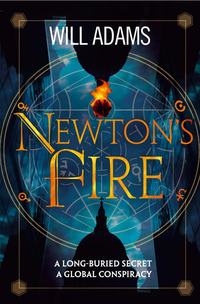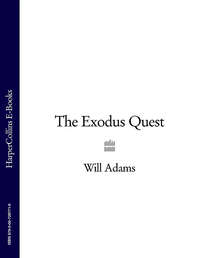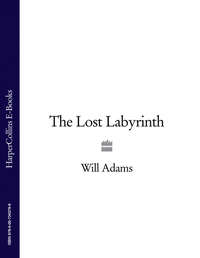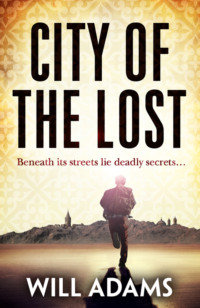
Полная версия
The Eden Legacy
‘We want you to track down this man Richardson,’ replied Sandro. ‘We want you to determine whether or not he is really Daniel Knox.’
‘And if he is?’ asked Boris.
Sandro glanced down at the floor, his discomfort evident. But a noise to Boris’s left startled him. He’d almost forgotten that Ilya was there. The old man clawed his mask down once more so that he could speak; his mouth and eyes were cruel and fierce, though his voice was so weak that Boris had to lean in closer to him to make out the words.
‘I want you to kill him,’ he said.
TWO
I
The tiger shark reappeared while Knox and the rest of his dive-team were at three metres, finishing their decompression. It circled several times, looking unnervingly interested, but then the inflatable arrived to pick them up, and the noise and churn of its outboard seemed to deter it, for it turned and swam away.
The Maritsa was chugging slowly towards them as they surfaced. It usually stayed well clear of the wrecksite, partly from respect for the nearby reefs, made doubly dangerous by the freak waves that sometimes came out of nowhere along this coast, but mostly to make it hard for anyone watching to mark the site of the wreck with a notional X. But the stern crane was the easiest way to recover artefacts the size of the anchor, which meant positioning directly above it.
As an archaeologist, Knox was accustomed to taking plenty of time examining artefacts in their context before recovering them; but that wasn’t possible here. They only had the Maritsa for six weeks, and once they were done they couldn’t lock this site up as they could on land, put a fence around it and hire security guards until the following year. It would be open season for any unscrupulous treasure hunter with some scuba gear or even an industrial dredge, so they needed to recover what they could, while they could.
They climbed the starboard gangway, stripped off on the stern deck, hosed themselves down with fresh water. A door banged open on the strengthening wind, and Ricky Cheung emerged from the conference room, puffing at one of his evil roll-ups. Ricky was the head of this salvage operation, an overweight Chinese American in his mid-fifties with perpetually tired eyes, as though he’d just woken. He waited a moment for a fair-haired woman in outsized sunglasses and a baseball cap to follow him outside, with Maddow the Shadow, his personal cameraman, bringing up the rear. Ricky spotted Knox and waved cheerfully, then led his small party over. ‘The hero of the hour,’ he beamed. ‘Great job down there.’
‘Thanks,’ said Knox.
Ricky nodded, turned to the fair-haired woman. ‘This is the one I was telling you about, Lucia,’ he said. ‘Matthew Richardson. Though everyone calls him Danny for some reason.’ He turned to Knox with a frown. ‘Why is that, actually?’
‘My father was Matthew too,’ said Knox, with practised ease. ‘Calling me Daniel saved confusion.’ In truth, he’d been such a mess for the first few months after Athens, especially from Mikhail Nergadze’s brutal murder of his fiancée Gaille, that he’d often not responded when people called him by his new name. At work one time, Miles—one of the few people who knew the truth about his past—had grown so exasperated by this that he’d yelled out his real name instead, provoking the obvious questions from his new colleagues, forcing him to come up with an explanation on the hoof. His handlers at MI5 had been admirably understanding about it, retrospectively tweaking his new identity to make Daniel his middle name; and he’d been Daniel ever since, except in interviews and other formal contexts.
‘Must have been one hell of a thrill,’ said Ricky. ‘Finding that anchor, I mean.’
‘Yes,’ agreed Knox.
‘Most archaeologists go their whole career without ever making a find like that.’
‘Quite.’
Ricky’s expression clouded briefly, as though he suspected Knox was making fun of him; but he quickly brightened again. ‘Lucia is here to write an article about me,’ he said.
‘About the salvage, actually.’ She removed her sunglasses, showing off striking blue eyes. She was in her mid-forties, at a guess, with an attractive, open face and the kind of pale freckled skin that needed protection from the Madagascan sun.
‘Pleased to meet you,’ said Knox.
‘I’ll leave you two together, if I may,’ said Ricky. ‘All those questions you had about history and archaeology, Danny Boy’s your man.’ He nodded cordially to them both, then walked briskly over to the stern crane, where the hoisting of the anchor was just getting underway, and barked out redundant orders for Maddow the Shadow to capture for posterity.
‘What a wretch!’ scowled Lucia. ‘That’s your triumph he’s stealing.’
‘He’s been working towards this for thirty years,’ said Knox. ‘I’ve been here less than a week.’
‘I’ve never met a man who talked about himself so much,’ she said. ‘I thought he must be a flamenco singer. You know: aye, aye, aye, aye, aye.’
Knox smiled politely. He knew better than to give a journalist easy copy about dissension in the ranks. ‘You have some questions for me?’ he suggested.
‘Yes.’ She gave him a warm smile, calibrated to win his sympathy. ‘I’m a travel writer really, you see. It’s how I pay for my holidays. I come to a place like this for a month with lots of ideas for possible features, but I’m never quite sure which will pan out and which won’t.’
‘I understand.’
‘I was supposed to be heading down to the Eden Nature Reserve today.’
‘The Kirkpatricks’ place?’
‘You know them?’
Knox gave a noncommittal shrug. ‘They’re pretty wellknown along this coast.’
‘They were supposed to have left a message letting me know when would be a good time to visit. But there was nothing at my hotel, and so I wanted to bag another story, just in case. My concierge suggested I come out here, and even arranged it for me, which was terrific of him; but of course I never had the chance to do any background reading, and your boss is a hard man to interrupt once he gets going. All that stuff about China and the treasure fleets—honestly, I had no idea what he was talking about half the time.’
Knox nodded. Ricky was notorious for giving lectures rather than interviews. ‘So you’d like a little background?’
‘That would be wonderful. Yes.’
‘Okay,’ said Knox. ‘Then let’s head on back to thirteenth-century China.’
II
Sandro Nergadze was walking Boris out to the courtyard when he touched his elbow and drew him to one side, out of earshot of staff and bodyguards. ‘A question,’ he said.
‘Yes?’
‘How do you feel about Davit Kipshidze?’
Blood rushed to Boris’s cheeks; anger clenched his heart. Davit was a former rugby lock he’d used a few times for strong-arm work, because the man was a giant and just having him standing beside you prevented a whole heap of trouble. But the moment their Greek enterprise had turned to shit, he’d broken like a little girl and blabbed his mouth off. He said bitterly: ‘You should have left him in Athens to rot.’
‘And have him reveal our secrets in open court?’ asked Sandro rhetorically. ‘Besides, he’s one of us. His father did some excellent work for us; his sister is married to my cousin. And a lot of our people like him. They say what happened in Athens wasn’t his fault, that he should never have been on that kind of a job in the first place.’
Boris bridled. He’d picked Boris for that mission himself, as Sandro knew full well. ‘He’d always done okay before.’
‘Of course,’ said Sandro smoothly. ‘It’s just that I’m hearing more and more that we should give him another chance.’
For the second time that day, Boris realised he’d been slow to see where Sandro was steering the conversation. ‘No,’ he said. ‘I’m not taking him with me. What if he gets spotted at the airport? He’ll take me down for sure.’
‘Relax. We’d send him on a later flight. You’d only meet up again in Madagascar.’
‘I don’t trust him. I won’t trust him. He wouldn’t do it anyway. He’s too much of a do-gooder.’
‘He might, if he didn’t know your real purpose.’ Sandro nodded through the front door to the courtyard, where a white van with tinted windows was parked on the cobblestones. ‘All he knows so far is that we’ve a possible job for him. What if we were to tell him only that Knox may still be alive, and that we want you both to go see if it really is him; and if so, to persuade him to a truce?’
‘He’s not that stupid.’
‘You’re wrong,’ said Sandro. ‘Men like Davit always assume the best about their fellow men. That’s why people like him. Besides, he wants to believe it. This is his opportunity to redeem himself for Athens.’
‘It’ll take more than this,’ snorted Boris.
‘And he’ll be useful to you. He’s the only other person we have who knows what Knox looks like, after all. He’s strong as a bull and he’s good with equipment too. Remember that computer business he tried to start?’
‘So?’
‘My father is taking a personal interest in this matter, as you’ve seen. We’ll therefore be supplying you with a satellite videophone.’
‘Are you fucking kidding me?’ scowled Boris. ‘You want me to top Knox live on TV? What if those bastards in Tbilisi are watching?
‘You think we’re idiots?’ asked Sandro. ‘All our equipment is fitted with our own encryption software. We use it all the time for our more … controversial businesses.’
Boris nodded. The Nergadzes had made their original fortune smuggling arms for heroin. If Sandro was confident that a communications link was secure, it was secure. ‘Okay,’ he said grudgingly.
‘Good. It’ll make it much easier for us to communicate and provide the necessary … logistical support.’
‘Logistical support,’ snorted Boris. Sandro did love his euphemisms. What he meant was that they’d have to get him a gun once he arrived in Madagascar, because there was no way to take one on board a plane, not these days. ‘And what will Davit think about that?’
‘I don’t imagine we’ll be having that conversation in his presence,’ said Sandro. ‘Do you?’
‘Okay,’ said Boris. ‘But I’m not doing this for free. Not on camera, for Christ’s sake. You offered five million euros for Knox’s head. I assume that’s still good.’
‘We retracted that offer once we learned Knox was dead.’
‘But he’s not dead.’
‘We’ll pay you one hundred thousand euros for the identification, whether it’s him or not,’ said Sandro. ‘If it is him, my father has authorised another four hundred thousand for … for carrying out his wishes.’
Boris nodded. Five hundred grand was proper money, and there’d surely be opportunities for more. The Nergadzes’ reputation and business empire had been badly hit by the fallout from the Greek debacle, but Ilya was still richer than God, and he clearly craved this revenge before he croaked. And revenge was like champagne: the more it cost, the better it tasted. ‘What about Davit?’ he asked. ‘You don’t expect me to split my money with him, do you?’
‘No,’ said Sandro. ‘I’ll make a separate agreement with Davit. Your money will be yours. His will be his. Agreed?’
‘Fine,’ said Boris. ‘Agreed.’
‘Good,’ said Sandro, nodding at the van. ‘Then let’s go talk to him.’
III
Lucia took a microcassette recorder from her bag. ‘You don’t mind, do you?’ she asked.
‘Of course not,’ said Knox.
She nodded at the crane, the metal beginning to groan and shriek a little as it took the weight of the anchor and began lifting it from the sea-bed. ‘And maybe we could go somewhere quieter?’
He led her up a gangway and past the ship’s decompression chamber, leaned against the starboard rail. The wind had picked up; the sea was getting frisky. The ship’s dynamic positioning system had been turned on, however, and its GPS sensors, gyroscopes and thrusters were keeping them impressively steady, a vital capability for using a crane on a sea-bed sixty metres deep. A large wave swept past them to break against the reef. On its far side, he could see the white cotton sails of several fishing pirogues in the lagoon, all of them heading for shore. ‘Better?’ he asked.
‘Perfect,’ said Lucia. ‘You were about to sweep me off to thirteenth-century China.’
‘The time of the Mongol Khans,’ said Knox. ‘Genghis was a conqueror. He rampaged through Russia and China and put the fear of God into Europeans.’ Literally, as it had happened: Christians had feared he and his armies were the end-times prophecy of Gog and Magog made flesh. ‘But his successors were different, particularly his grandson Kublai.’
‘In Xanadu did Kublai Khan a sacred pleasure dome decree,’ suggested Lucia.
‘That’s the guy,’ agreed Knox. ‘He saw himself as a ruler more than a general, and China was the jewel in his crown. He established a new capital at Beijing, tried to win over his new Chinese subjects by appointing them to key positions. But it never really took. The Han and the Mongols each considered the other inferior. And these were tough times anyway. China was hit by the black death almost as badly as Europe, and there was massive flooding, hyperinflation, poverty and famine. The Han began to rebel, as did other ethnic groups. The first uprisings were quashed but each new one weakened the Mongols’ grip a little more until the empire finally collapsed in 1368. One of the rebel leaders, a Han called Zhu Yuanzhang, seized the Dragon Throne and proclaimed himself first emperor of the Great Ming.’
‘That being the start of the Ming Dynasty, presumably?’
‘Yes. Zhu Yuanzhang held power for thirty years or so, but his succession proved a problem. His eldest son, the Crown Prince, died before him, forcing him to pick between his own most capable surviving son—a man called Zhu Di—or to skip a generation and appoint his grandson Zhu Yunwen instead. He went for his grandson.’
‘Don’t tell me: Zhu Di got mad.’
‘It depends on who you believe,’ Knox told her. ‘We know that Zhu Yunwen was worried sick about rivals. After his ascension, he barred Zhu Di from even paying respects to his dead father—a major humiliation—then stripped his supporters of rank, effectively forcing him to give up or fight back. He chose to fight back. Skirmishes with the imperial army turned into a lowlevel civil war. In 1402, Zhu Di marched on Nanjing, China’s new capital, and his nephew fled. Then he declared himself the Yongle Emperor. Emperor of eternal happiness.’
Lucia smiled. ‘No worries about raising expectations, then.’
‘He didn’t do too badly, all in all. He excised his nephew from the history books and purged his supporters; but that was pretty standard. He fought off the Mongols and the Vietnamese, introduced land reclamation and other successful agricultural policies, rebuilt the Grand Canal and moved his capital back to Beijing. He also commissioned a series of magnificent armadas.’
‘Ah. Our famous treasure fleets.’
‘This was unprecedented. The Han Chinese were Confucians; only China mattered. If the barbarian world had business with China, it had to make the journey itself. But Zhu Di didn’t think that way. He wanted to show off, and maybe let it be known around the region that he wasn’t a man to mess with. His nephew was rumoured still to be alive, after all, so the last thing he’d have wanted was any lingering questions about his legitimacy. Whatever his reasons, he ordered a man called Zheng He to build a vast fleet then sail around the China Seas to establish diplomatic and trading links, suppress any unrest in China’s overseas territories, that kind of thing.’
‘Zheng He. This would be the eunuch, right?’
‘Yes. He was actually a Chinese Muslim whose family had fought with the Mongols, and he was taken captive and then castrated when still just a boy. It happened a lot back then. But he made a name for himself, become one of Zhu Di’s favourites.’ Lucia raised an eyebrow, making Knox laugh. ‘Not in that sense,’ he assured her. ‘Zhu Di liked the ladies. Koreans, for choice. But that was precisely why he trusted eunuchs: they wouldn’t cause mischief in his harem, and they had no dynastic ambitions of their own.’
‘Okay. So Mr Eternal Happiness commissions his favourite eunuch to go sailing. And there were multiple voyages, right?’
‘Seven in all, though the final one was much later, more an afterthought than anything. Mostly they visited the places you’d expect: Sumatra and Java and the other main Indonesian islands. Vietnam, Thailand, Sri Lanka, Malaya, India. Places which were pretty well known to the Chinese. Their fourth voyage made it to Arabia and East Africa, but it’s the sixth that’s the most intriguing. Zheng He didn’t actually go very far himself, but various of his vice-admirals each led a contingent of their own, and we’re not entirely sure where they went, not least because there was a great fire in Beijing shortly after they set out, which the emperor interpreted as a divine admonishment against his treasure fleets, so all records of the voyage were destroyed.’
‘And this anchor of yours would have come from this sixth voyage, right?’
‘Most likely,’ agreed Knox. ‘Though Chinese ships were hopeless at sailing against the wind: they pretty much had to go wherever the weather took them. That was fine, most of the time, because the trade winds are very reliable between Africa and China. But if some Chinese ship from one of the other fleets had been blown off course at the wrong time, it might have had little choice except to end up here. And these armadas were huge. There were supposed to be three hundred and seventeen ships in the first voyage alone, carrying over twenty-eight thousand people. Even allowing for some exaggeration, that’s pretty damned impressive. The demand for wood was so intense that they deforested whole regions of China. Most of the ships were supply boats, troop transports, that kind of thing. Others were for cargo, for these were trading missions too, swapping Chinese silks and porcelain for highly prized goods like pearls, ivory and exotic woods. But each fleet also included a number of what were known as treasure ships. These were floating palaces, really; or perhaps more accurately embassies, designed specifically to impress and intimidate foreign powers. They were reputed to be over four hundred feet long and a hundred and eighty feet wide. That’s like floating a football stadium out to sea. This was ninety-odd years before Columbus, yet these beasts were more than twice as wide as the Santa Maria was long. They had nine masts, the tallest of which was said to have stood over three hundred feet high.’
‘Three hundred feet?’ Lucia pulled a face. ‘Is that even possible?’
‘A lot of historians and shipbuilders think not. They say the treasure ships were more likely to have been sixmasters, only about two hundred foot long.’ He gave a little grin, nodded over the side of the ship down towards the sea-bed. ‘But that’s what makes all this so exciting: we won’t know one way or the other until we—’ Cheers and hoots erupted at the stern. He looked around to see that the anchor had just breached the surface of the water, like some great whale coming up for air, streams of seawater cascading from it and the steel cable and the hoist straps at either end as it was slowly raised higher and higher.
‘Wow!’ murmured Lucia, producing a camera from her bag.
‘You want to go closer?’ asked Knox. She nodded eagerly, so he led her back down. The crane arm began to turn, bringing the black and rust-red anchor around over the deck, its cables and straps creaking loudly from the stress, everyone standing well clear. When the anchor was above the open hatches of the hold, the crane operator stopped it and gave it a few moments to come to rest. Crewmen gathered on every side, holding their hands out to stop the anchor from swinging, buffer it from banging against the sides as it was lowered into the hold, where the project’s conservators were already waiting.
‘It truly is something,’ said Lucia, snapping away. ‘I hadn’t imagined it would be—’ She jumped visibly at a loud bang from behind her, as though something electrical had blown. They all looked around. The ship listed a little to port, and the anchor began to swing again, like a gigantic pendulum nudged by a celestial finger. Knox glanced over at Miles and saw the anxiety on his face that he knew would be mirrored on his own.
One of their dynamic positioning thrusters had blown. And that meant trouble.
THREE
I
Kirkpatrick Films’ Head Office, Covent Garden, London
Rebecca Kirkpatrick was doing her best to concentrate on what Titch Osmond, her Chief Financial Officer, was telling her, but it was hard, what with Nicola’s scribbled note in her lap. She glanced surreptitiously down at it yet again.
Pierre Demullin (???) called. From Madagascar (!?!). Will call back later.
All those exclamation and question marks; they’d got beneath her skin. She was constantly getting calls from all over the world, and it was hardly a secret that her mother had been Malagasy, if only because of her own mix of Polynesian, African and European looks. So what about this particular message had made all those exclamation marks necessary? She breathed in deep, trying to maintain her calm. It wasn’t that surprising that Pierre should call. He was her childhood neighbour and her father’s closest friend, as well as her sister Emilia’s lover and the father of her infant son Michel. Yet Rebecca hadn’t spoken to him in eleven years, and the truth was she couldn’t imagine what would have prompted him to call her, not out of the blue like this.
‘Your mind’s not on it,’ said Titch. ‘Shall we do this later?’
Rebecca smiled with artificial brightness. It wasn’t as if there was anything she could do before Pierre rang back, after all. ‘It’s fine,’ she assured him. ‘You were telling me about our cash-flow.’
‘Yes,’ said Titch, flipping on through his ring-binder. ‘We need another sixty-seven to see us through to July.’
‘Sixty-seven?’ She wrinkled her nose. ‘Is that all?’
He gave a wry laugh. ‘Sixty-seven’s not nothing, you know.’
‘Can’t we borrow?’ She glanced down at Nicola’s note again. It wasn’t quite true that she couldn’t imagine why Pierre might call. That was the thing that was unnerving her. He’d certainly be the person to contact her in an emergency if neither Adam nor Emilia could get to a phone.
‘You think I haven’t tried?’ frowned Titch, as though she’d cast a slur upon his character. ‘No one will lend us any more.’
‘Why not? We’re profitable, aren’t we?’
‘On paper, yes.’ He looked up and momentarily caught her eye before hurriedly looking away again, his cheeks flaming. A couple of months before, out at a working dinner, he’d seized her hand in both of his and declared undying love. She’d put it down at the time to alcohol and the recent break-up of his marriage, but little moments like this made her wonder if it wasn’t more serious than that. She devoutly hoped not. She was deeply fond of Titch, and valued him highly, yet she felt nothing remotely romantic for him. He bowed his head and turned another leaf in his ring-binder. ‘But we have no assets to speak of,’ he continued, ‘and we keep hitting these cash-flow problems, and those two together are like a big flashing red light to the banks.’
‘So what do you recommend?’ The question was, what kind of emergency would keep both Adam and Emilia from the phone?
‘Well,’ said Titch. ‘We have three main avenues. I’m talking as the company here, you understand. The first thing we can do is, we can go after the people who owe us money.’






